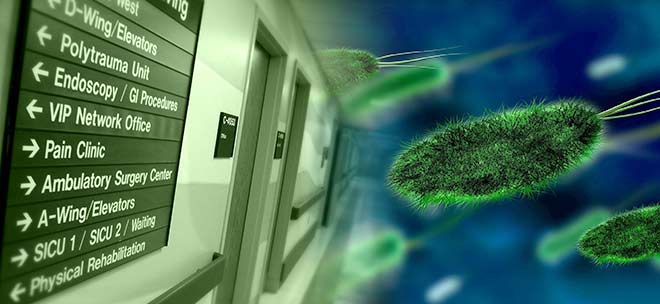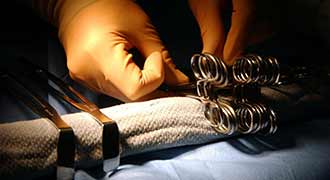If you have contracted a hospital infection while receiving medical care, you may be entitled to compensation for medical bills, lost income and pain and suffering, among other losses. We are working with experienced hospital infection medical malpractice lawyers in RI and MA, who charge no fee unless you receive a settlement or award. Feel free to call us toll free 24/7 or contact us online for a free (no obligation) case evaluation.

Have You Developed an Infection After Visiting a RI or MA Hospital?
Call The Hospital Infection Lawyers of d’Oliveira & Associates Today
What Is a Healthcare Associated Infection (HAI)?
A Healthcare Associated Infection (HAI) is an infection that develops while a patient is receiving medical care. These infections are also known as Hospital-Acquired Infections, but because these infections are not limited to hospital environments, but can be transmitted in any health care setting, they are now referred to as Healthcare-Associated Infections, or HAIs.
According to the Centers of Disease Control and Prevention (CDC), approximately one out of every twenty patients will contract an HAI. These infections are a significant cause of death in the United States. Annually, it is estimated that there are about 1.7 million HAIs occurring in U.S. hospitals, and close to 99,000 patient deaths are caused by or associated with the HAI. These infections are the most common adverse event in health care.
What Is My Hospital Infection Medical Malpractice Case Worth?
Depending on the seriousness of the error and injury you could be entitled to compensation for:
- Current and Future Medical Bills;
- Lost Wages;
- Loss of Future Earnings;
- Pain and Suffering;
- Permanent Scarring and Disfigurement;
- Wrongful Death.
The experienced hospital infection lawyers that we work with can answer any questions that you may have regarding the value of your potential medical malpractice lawsuit.
Where Do Healthcare Related Infections Usually Happen?

- An Ambulance
- Clinic
- Doctor’s Office
- Hospital
- Mental Health Facility
- Nursing Home
If you have suffered from a healthcare related infection it is important that you contact a hospital infection medical malpractice lawyer, who can assist you with your possible claim.
What Are Common Ways To Contract A Hospital Infection?
- Use of medical devices within the body (for example, catheters)
- Surgical procedures
- Injections
- Reuse of syringes and needles
- Contamination of the health care environment
- Improper sterilization and disinfection practices
- Transmission of communicable diseases between patients and health care workers
- Overuse or improper use of antibiotics
- Using single-use medication vials for multiple patients
What Are The Most Common Healthcare Associated Infections?
In recent years, healthcare providers have become increasingly able to prevent HAIs through adherence to clean and safe healthcare procedures. However, statistics show that the rate of many of these serious infections is either becoming worse, or not changing at all.
These infections can be the result of any number of bacteria, viruses, or fungi, and there are many different ways that the infections can be contracted. These infections can have devastating, and even deadly, consequences for those patients, who contract them.
The most common infections are:
- Central Line-associated Bloodstream Infections: A central line is a tube that is inserted in a large vein in the arm, neck or chest that is used to deliver fluids, blood, or medications to the patient. A central line infection can lead to a blood infection, which can often be fatal to the patient.
 Surgical Site Infection (SSI): When a patient has surgery, sometimes a virus, bacteria, or fungus can enter the body at the incision point. The infection can then spread to organs or other tissues under the skin. Some of the infections that are contracted due to surgery include MRSA (Methicillin-resistant Staphylococcus aureus), which is a skin infection that is resistant to antibiotics.
Surgical Site Infection (SSI): When a patient has surgery, sometimes a virus, bacteria, or fungus can enter the body at the incision point. The infection can then spread to organs or other tissues under the skin. Some of the infections that are contracted due to surgery include MRSA (Methicillin-resistant Staphylococcus aureus), which is a skin infection that is resistant to antibiotics.- Ventilator-associated Pneumonia: A ventilator is a machine that assists a patient with breathing, and if germs enter through the tube from the ventilator, the patient can develop a lung infection, otherwise known as pneumonia.
- Catheter-associated Urinary Tract Infection: A catheter is a tube inserted into the bladder to drain urine from the patient’s body. If bacteria enter the body through the catheter, the patient can develop a urinary tract infection. Urinary tract infections can be extremely painful, and if not treated properly, can lead to bladder and kidney infections.
- Clostridium difficile Infection (C. diff / CDI): Clostridium difficile is a bacterium that develops as a result of prolonged use of antibiotics. This can cause serious gastrointestinal infection or colitis.
What Are Bacteria That Cause Hospital Infections?

Infections contracted in the healthcare setting can occur in many of the different ways mentioned above, but they can also include a variety of different bacteria, viruses, or fungi. Some of the types of infections that can be contracted at a healthcare facility include:
- Acineobacter – This type of bacteria results in an infection that rarely occurs outside of the hospital setting.
- Burkholderia cepacia – This bacteria is often resistant to antibiotics, and is often contracted by patients with cystic fibrosis.
- Clostridium Sordelli – This rare bacterium can cause pneumonia, inflammation of the heart and abdominal area, arthritis, and gangrene.
- Hepatitis – These viral infections include Hepatitis A, B, and C, and they primarily affect the liver. The contraction of Hepatitis in the healthcare setting affects both patients and healthcare workers.
- Human Immunodeficiency Virus (HIV/AIDS) – This virus leads to a breakdown in the immune system. Exposure to HIV in the healthcare setting is extremely rare, but can occur.
- Influenza – More commonly known as the flu, influenza is contracted in many places outside of healthcare settings, but outbreaks can occur in hospitals.
- Klebsiella – This bacterium can cause pneumonia, blood infections, skin infections, and meningitis. This bacterium is often antibiotic-resistant.
- MRSA (Methicillin-resistant Staphylococcus aureus) – Although MRSA is the most commonly known strain, many different types of Staph infections can occur.
- Mycobacterium abscessus – This bacterium can contaminate medications and medical devices, and it can cause skin and lung infections.
- Norovirus – Noroviruses cause gastroenteritis, which is an inflammation of the stomach and intestines. Symptoms of a norovirus include severe vomiting and diarrhea.
- Tuberculosis (TB) – TB is spread through the air and is the result of a patient with TB going undiagnosed in the healthcare setting, thus spreading the disease throughout the facility.
How Can You Protect Yourself Against a Hospital Infection?
Patient Steps to Prevent Infection:
- Clean your hands
- Make sure health care providers clean their hands and wear gloves
- Cover your mouth and nose
- If you are sick, avoid close contact with others
- Get shots to avoid disease and fight the spread of infection
Why Call Us?
 If you have suffered from a hospital infection you may be entitled to compensation for your medical bills, lost income and pain and suffering, among other losses. It is important that you contact an experienced hospital infection medical malpractice lawyer in Rhode Island or Massachusetts to handle your case. We are working with experienced medical malpractice lawyers, who charge no fee until they get you money. You can contact us by phone or fill out a contact form for a free (no obligation) case evaluation.
If you have suffered from a hospital infection you may be entitled to compensation for your medical bills, lost income and pain and suffering, among other losses. It is important that you contact an experienced hospital infection medical malpractice lawyer in Rhode Island or Massachusetts to handle your case. We are working with experienced medical malpractice lawyers, who charge no fee until they get you money. You can contact us by phone or fill out a contact form for a free (no obligation) case evaluation.
